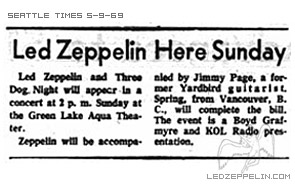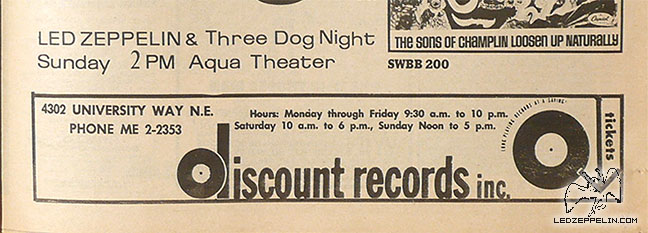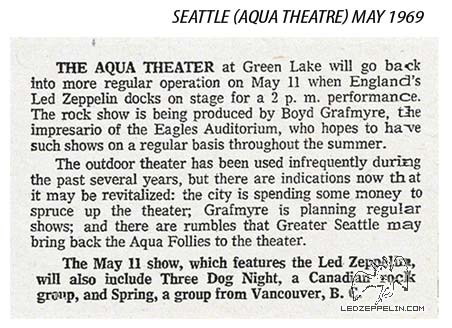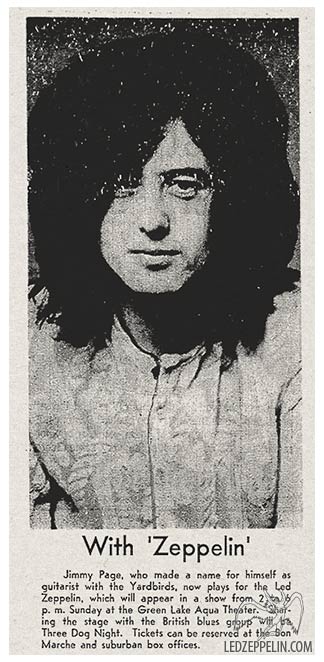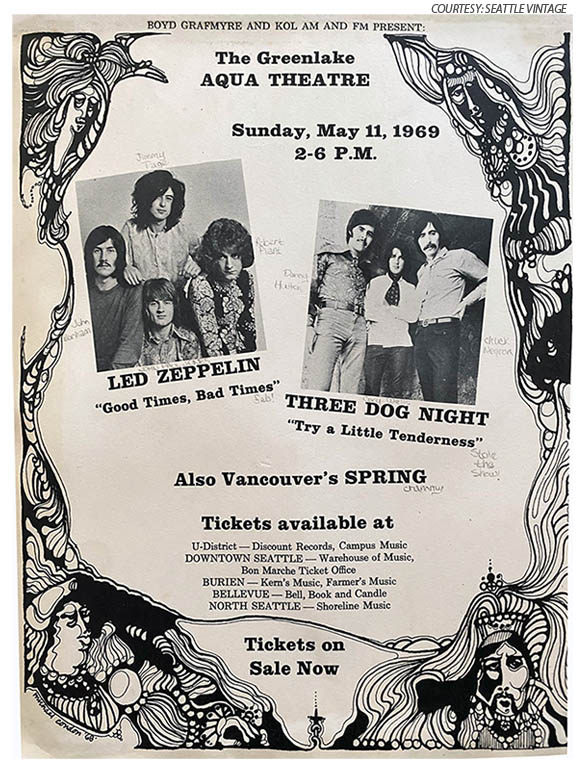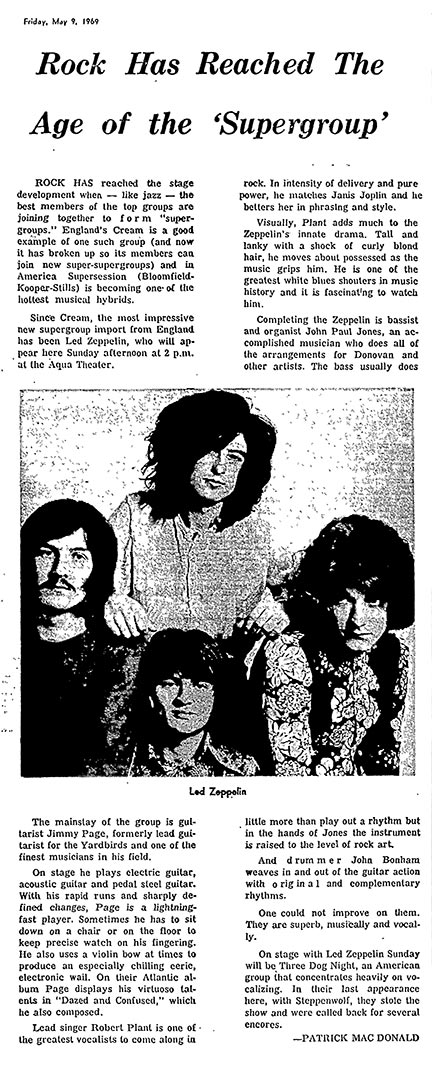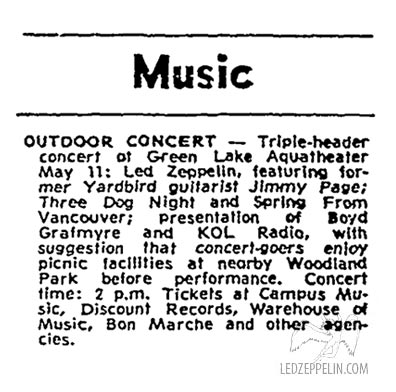Includes: Train Kept a Rollin', I Can't Quit You Baby, Dazed and Confused, White Summer / Black Mountainside, You Shook Me, How Many More Times (incl. Lemon Song), Communication Breakdown.
"Whole Lotta Love" possibly performed at this show, introduced as "a song from our upcoming album", according to a fan in attendance.
Opening acts: Spring, Jaime Brockett, Translove Airlines, Three Dog Night
Led Zeppelin rocks Seattle's outdoor Green Lake Aqua Theatre on May 11, 1969.
On Sunday May 11, 1969, the up-and-coming British rock 'n' roll band, Led Zeppelin, performs a legendary concert at a most unusual venue: Seattle's Green Lake Aqua Theatre. That theater -- an outdoor stage set on the western edge of one of the town's most popular parks -- had been built in 1950 to feature shows by the Aqua Follies and so it boasted a stage with a 40-foot diving tower on each side, and a pool between the stage and the 5,000-capacity concrete grandstand. Although the theater was generally dedicated to rather lite fair -- "swimusicals," comedic plays, and a jazz festival or two -- by 1965 rock 'n' roll promoters began producing the occasional show there with pop stars such as Sonny & Cher or Ian Whitcomb. So, clearly, bringing the world's heaviest hard-rock band, Led Zeppelin, into the place was raising the stakes in a seismic way -- and the theater would ultimately pay the highest price by sacrificing its life in the wake of that thundering event.
The Seattle Post-Intelligencer reported that on that sunny day "several thousand of the whimsically clad and nearly unclad younger set" attended, but that "only about half the crowd" paid for their entry tickets -- the "rest bent their freeloading ears to the amplified sounds from a variety of places. Some roosted in the trees, many crowded onto one small dock, it submerged slightly. A flotilla of canoes, rented rowboats and rubber rafts surrounded the back side of the stage, where a few also treaded water. A hundred perched on the roof of a concession stand. And a thousand or so sprawled out on the lawns around the theater, forming a wall-to-wall carpet of human bodies." The Seattle Times concurred: "The audience was everywhere. The benches in the Aqua Theatre were filled to overflowing ... . Several energetic souls treaded water in the pool between the stands and the stage. There were even two swimsuit-clad fellows perched atop the roof of one of the diving towers."
A Landmark
The show – which was produced by counterculture impresario, Boyd Grafmyre, in conjunction with KOL radio (whose top DJ, Burl Barer, emceed the event) -- began about 2 p.m. with an unremarkable opening set by the Vancouver B.C., rock band Spring. Next up was Cambridge-based songster, Jaime Brockett, and his talking-blues FM radio hit, "The Legend of the U.S.S. Titanic." Then, while the roadies were setting up Led Zep's gear, Seattle's own hippie jug-band, Translove Airlines, played a shambling set. The Seattle Times tolerantly noted that bandleader Jimmy Winkler was a fellow "[g]ifted with a complete lack of talent, but an abundance of charm" and thus, "he has become a landmark at Seattle concerts" where "at nearly every concert [he] appears on stage at the earliest and slightest lull in the program" (Gressel). True to form, at the end of his band's set, Winkler reportedly jumped into the theater's pool to the great delight of the audience.
Then, right before the headlining performance by Three Dog Night -- a Los Angeles-based pop group with a trio of soulful vocalists -- it was Led Zeppelin's turn. A supergroup that had risen from the ashes of England's esteemed psychedelic blues-rockers, the Yardbirds -- Led Zeppelin had actually already played the Seattle Center Arena (on December 27, 1968, albeit in an unadvertised opening role for Vanilla Fudge). But since the January 12, 1969, release of their earth-shattering eponymous debut album, Led Zep's popularity had skyrocketed. Still, Three Dog Night -- whose second AM radio hit single, "One," was resting in the national Top-10 -- were the more famous band that spring. Meanwhile, Seattle's premier AM radio station, KJR, had Led Zep's debut single "Good Times Bad Times" single in their Fab-50 charts that May, and KOL-AM also began pushing the same ultra-heavy tune.
Row, Row, Row Your Boat
Among those fans who'd opted to watch the show from a watercraft were Mick Flynn -- a guitarist with the local band, Meatball, and one of Seattle's first vintage gear experts -- and his pal and housemate, Richard Green. "Me and my buddies were living over in Wallingford," said Flynn, "and we wanted to go to the show. We couldn't afford tickets, but we did have enough money to rent a rowboat at Green Lake. So what we did was: we rowed across the lake and watched the show from the back of the stage -- which was pretty cool! We were probably within six feet of the amps so we had a really good view of the band" (Interview).
"There was three or four of us in the rowboat," adds Green, "and we rowed over to the Aqua Theatre. It was a beautiful sunny day in the afternoon. We floated up to the dock which was the backstage area and there was actually a fence around the back of the dock and we held onto the fence with our fingers so we wouldn't drift away. And from our position we could see the amplifiers and people milling around backstage. So Led Zeppelin came on and from our position we could look through the stacks of amplifiers and see Robert Plant and Jimmy Page onstage playin' their guts out. And I remember Robert Plant's hair blowin' in the wind. It was such a thrill to be there" (Interview).
Good Times
The show began, as Green recalls, with guitarist Jimmy Page running onstage wearing a hip black leather motorcycle jacket and hammering out the riffs to the old Yardbirds classic, "Train Kept a Rollin'," before the rest of Led Zep joined him. "The Green Lake show was pretty cool 'cause they were doing the first album," says Flynn, "and that's what they sounded like. Page was using his Les Paul [Gibson guitar] and playing the Marshall [amplifier] heads through the Rickenbacker Tri-Sonic cabinets. He also had the Danelectro [guitar] that he used on the instrumentals: [like] 'Black Mountain Side.' I think [that solo bit] was kinda a combination of Yardbirds and Led Zeppelin stuff he was doing" (interview).
Some in the audience had, presumably, not yet been exposed the Led Zeppelin album and came wanting to hear the AM radio hit, "Good Times Bad Times." But the band was first going to play that single's flipside and their crowd reportedly responded with some disappointment: "I remember," another fan wrote years after the fact, "Robert Plant saying to the audience that they were going to play the single 'Communication Breakdown,' to a light smattering of boos and requests for 'Good Times Bad Times,' which is what the local stations were playing more often" (Wade).
Green and Red
Meanwhile, at mid-set -- "when Page was out doin' his solo bit," as Flynn recalls, "Robert Plant and John Paul Jones came back to where we were and we partaked in some weed with them. That was kinda cool. They came over and chatted with us." "I remember that at some point," Green adds, "Robert Plant was milling around behind the amplifiers and I said somethin' to him and he walked over towards us. We had some small talk back and forth and we happened to have a joint lit at the time -- I remember it being Panama Red! -- and so we handed him the joint, he took a couple hits off of it and handed it back and thanked us for coming. He said 'I hope you enjoy the show' and that was it" [laughter] (Interview).
Like many fans, Flynn and Green loved the show, and later even got a chance to chat with Led Zep's star guitarist: "Page came over," says Flynn, "and we talked for a moment. [I] said somethin' about his guitar. 'Cause I was always interested in checking out the gear -- a lot of that stuff you just didn't see 'til these guys came through: twin Marshalls and stuff" (Interview)
You Shook Me
From all accounts, Led Zeppelin shook the theater to its very foundations -- along with surrounding neighborhoods. One can only have sympathy for all of the traumatized animals in the adjacent Woodland Park Zoo. Not to mention for poor Three Dog Night, who faced the daunting task of following Led Zep onto that stage. Plenty of testimony, however, attests to the fact that the headliners performed well under the circumstances. Indeed, contemporary reviews were split: Seattle Post-Intelligencer reporter (and KOL-FM DJ) Patrick MacDonald was ecstatic over Led Zep -- even in advance of the show he was already stoked, writing that their musicianship was "most impressive" and that "One could not improve on them. They are superb, musically and vocally."
But MacDonald's counterpart at The Seattle Times, Janine Gressel, was far more impressed with Three Dog Night. Though acknowledging (in a rather stingy four-sentence blurb out of a 15 paragraph essay) that "The Led Zeppelin ... put on an instrumentally excellent performance" -- she presumably wasn't thrilled by singer Robert Plant's proto-heavy metal vocal stylings -- noting that Three Dog Night, whose "singing is the core of this excellent band," simply "stole the show."
Concrete Breakdown
Possibly the aging Aqua Theatre had met its match with the mighty Led Zep. Later that summer city inspectors discovered damage to the structure and -- following one final show there by the Grateful Dead on August 20, 1969 -- its brief life as a rock venue was over. The facility's dismantling began in 1970.
Led Zeppelin and the Northwest had, however, merely begun their mutually fond relationship. Not only would the band perform at the Seattle Pop Festival (at Woodinville's Gold Creek Park) on July 27, 1969, but they would return to Seattle many more times before their final show here (and fourth to the last American show ever) at the Kingdome on July 17, 1977.
Opening acts: Spring, Jaime Brockett, Translove Airlines, Three Dog Night
Led Zeppelin rocks Seattle's outdoor Green Lake Aqua Theatre on May 11, 1969.
On Sunday May 11, 1969, the up-and-coming British rock 'n' roll band, Led Zeppelin, performs a legendary concert at a most unusual venue: Seattle's Green Lake Aqua Theatre. That theater -- an outdoor stage set on the western edge of one of the town's most popular parks -- had been built in 1950 to feature shows by the Aqua Follies and so it boasted a stage with a 40-foot diving tower on each side, and a pool between the stage and the 5,000-capacity concrete grandstand. Although the theater was generally dedicated to rather lite fair -- "swimusicals," comedic plays, and a jazz festival or two -- by 1965 rock 'n' roll promoters began producing the occasional show there with pop stars such as Sonny & Cher or Ian Whitcomb. So, clearly, bringing the world's heaviest hard-rock band, Led Zeppelin, into the place was raising the stakes in a seismic way -- and the theater would ultimately pay the highest price by sacrificing its life in the wake of that thundering event.
The Seattle Post-Intelligencer reported that on that sunny day "several thousand of the whimsically clad and nearly unclad younger set" attended, but that "only about half the crowd" paid for their entry tickets -- the "rest bent their freeloading ears to the amplified sounds from a variety of places. Some roosted in the trees, many crowded onto one small dock, it submerged slightly. A flotilla of canoes, rented rowboats and rubber rafts surrounded the back side of the stage, where a few also treaded water. A hundred perched on the roof of a concession stand. And a thousand or so sprawled out on the lawns around the theater, forming a wall-to-wall carpet of human bodies." The Seattle Times concurred: "The audience was everywhere. The benches in the Aqua Theatre were filled to overflowing ... . Several energetic souls treaded water in the pool between the stands and the stage. There were even two swimsuit-clad fellows perched atop the roof of one of the diving towers."
A Landmark
The show – which was produced by counterculture impresario, Boyd Grafmyre, in conjunction with KOL radio (whose top DJ, Burl Barer, emceed the event) -- began about 2 p.m. with an unremarkable opening set by the Vancouver B.C., rock band Spring. Next up was Cambridge-based songster, Jaime Brockett, and his talking-blues FM radio hit, "The Legend of the U.S.S. Titanic." Then, while the roadies were setting up Led Zep's gear, Seattle's own hippie jug-band, Translove Airlines, played a shambling set. The Seattle Times tolerantly noted that bandleader Jimmy Winkler was a fellow "[g]ifted with a complete lack of talent, but an abundance of charm" and thus, "he has become a landmark at Seattle concerts" where "at nearly every concert [he] appears on stage at the earliest and slightest lull in the program" (Gressel). True to form, at the end of his band's set, Winkler reportedly jumped into the theater's pool to the great delight of the audience.
Then, right before the headlining performance by Three Dog Night -- a Los Angeles-based pop group with a trio of soulful vocalists -- it was Led Zeppelin's turn. A supergroup that had risen from the ashes of England's esteemed psychedelic blues-rockers, the Yardbirds -- Led Zeppelin had actually already played the Seattle Center Arena (on December 27, 1968, albeit in an unadvertised opening role for Vanilla Fudge). But since the January 12, 1969, release of their earth-shattering eponymous debut album, Led Zep's popularity had skyrocketed. Still, Three Dog Night -- whose second AM radio hit single, "One," was resting in the national Top-10 -- were the more famous band that spring. Meanwhile, Seattle's premier AM radio station, KJR, had Led Zep's debut single "Good Times Bad Times" single in their Fab-50 charts that May, and KOL-AM also began pushing the same ultra-heavy tune.
Row, Row, Row Your Boat
Among those fans who'd opted to watch the show from a watercraft were Mick Flynn -- a guitarist with the local band, Meatball, and one of Seattle's first vintage gear experts -- and his pal and housemate, Richard Green. "Me and my buddies were living over in Wallingford," said Flynn, "and we wanted to go to the show. We couldn't afford tickets, but we did have enough money to rent a rowboat at Green Lake. So what we did was: we rowed across the lake and watched the show from the back of the stage -- which was pretty cool! We were probably within six feet of the amps so we had a really good view of the band" (Interview).
"There was three or four of us in the rowboat," adds Green, "and we rowed over to the Aqua Theatre. It was a beautiful sunny day in the afternoon. We floated up to the dock which was the backstage area and there was actually a fence around the back of the dock and we held onto the fence with our fingers so we wouldn't drift away. And from our position we could see the amplifiers and people milling around backstage. So Led Zeppelin came on and from our position we could look through the stacks of amplifiers and see Robert Plant and Jimmy Page onstage playin' their guts out. And I remember Robert Plant's hair blowin' in the wind. It was such a thrill to be there" (Interview).
Good Times
The show began, as Green recalls, with guitarist Jimmy Page running onstage wearing a hip black leather motorcycle jacket and hammering out the riffs to the old Yardbirds classic, "Train Kept a Rollin'," before the rest of Led Zep joined him. "The Green Lake show was pretty cool 'cause they were doing the first album," says Flynn, "and that's what they sounded like. Page was using his Les Paul [Gibson guitar] and playing the Marshall [amplifier] heads through the Rickenbacker Tri-Sonic cabinets. He also had the Danelectro [guitar] that he used on the instrumentals: [like] 'Black Mountain Side.' I think [that solo bit] was kinda a combination of Yardbirds and Led Zeppelin stuff he was doing" (interview).
Some in the audience had, presumably, not yet been exposed the Led Zeppelin album and came wanting to hear the AM radio hit, "Good Times Bad Times." But the band was first going to play that single's flipside and their crowd reportedly responded with some disappointment: "I remember," another fan wrote years after the fact, "Robert Plant saying to the audience that they were going to play the single 'Communication Breakdown,' to a light smattering of boos and requests for 'Good Times Bad Times,' which is what the local stations were playing more often" (Wade).
Green and Red
Meanwhile, at mid-set -- "when Page was out doin' his solo bit," as Flynn recalls, "Robert Plant and John Paul Jones came back to where we were and we partaked in some weed with them. That was kinda cool. They came over and chatted with us." "I remember that at some point," Green adds, "Robert Plant was milling around behind the amplifiers and I said somethin' to him and he walked over towards us. We had some small talk back and forth and we happened to have a joint lit at the time -- I remember it being Panama Red! -- and so we handed him the joint, he took a couple hits off of it and handed it back and thanked us for coming. He said 'I hope you enjoy the show' and that was it" [laughter] (Interview).
Like many fans, Flynn and Green loved the show, and later even got a chance to chat with Led Zep's star guitarist: "Page came over," says Flynn, "and we talked for a moment. [I] said somethin' about his guitar. 'Cause I was always interested in checking out the gear -- a lot of that stuff you just didn't see 'til these guys came through: twin Marshalls and stuff" (Interview)
You Shook Me
From all accounts, Led Zeppelin shook the theater to its very foundations -- along with surrounding neighborhoods. One can only have sympathy for all of the traumatized animals in the adjacent Woodland Park Zoo. Not to mention for poor Three Dog Night, who faced the daunting task of following Led Zep onto that stage. Plenty of testimony, however, attests to the fact that the headliners performed well under the circumstances. Indeed, contemporary reviews were split: Seattle Post-Intelligencer reporter (and KOL-FM DJ) Patrick MacDonald was ecstatic over Led Zep -- even in advance of the show he was already stoked, writing that their musicianship was "most impressive" and that "One could not improve on them. They are superb, musically and vocally."
But MacDonald's counterpart at The Seattle Times, Janine Gressel, was far more impressed with Three Dog Night. Though acknowledging (in a rather stingy four-sentence blurb out of a 15 paragraph essay) that "The Led Zeppelin ... put on an instrumentally excellent performance" -- she presumably wasn't thrilled by singer Robert Plant's proto-heavy metal vocal stylings -- noting that Three Dog Night, whose "singing is the core of this excellent band," simply "stole the show."
Concrete Breakdown
Possibly the aging Aqua Theatre had met its match with the mighty Led Zep. Later that summer city inspectors discovered damage to the structure and -- following one final show there by the Grateful Dead on August 20, 1969 -- its brief life as a rock venue was over. The facility's dismantling began in 1970.
Led Zeppelin and the Northwest had, however, merely begun their mutually fond relationship. Not only would the band perform at the Seattle Pop Festival (at Woodinville's Gold Creek Park) on July 27, 1969, but they would return to Seattle many more times before their final show here (and fourth to the last American show ever) at the Kingdome on July 17, 1977.
Includes: Train Kept a Rollin', I Can't Quit You Baby, Dazed and Confused, White Summer / Black Mountainside, You Shook Me, How Many More Times (incl. Lemon Song), Communication Breakdown.
"Whole Lotta Love" possibly performed at this show, introduced as "a song from our upcoming album", according to a fan in attendance.
